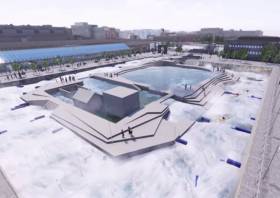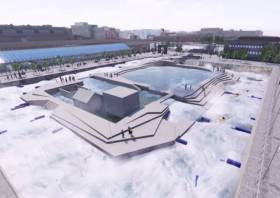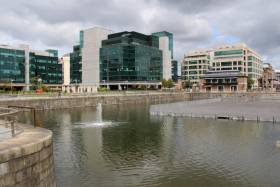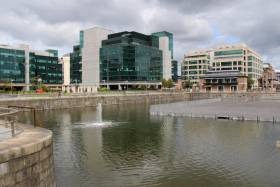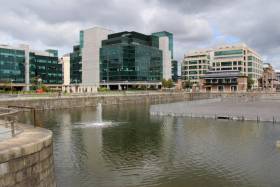Displaying items by tag: George's Dock
Councillors Approve White Water Rafting Centre For George’s Dock
Dublin City councillors have voted to approve controversial plans for a white water rafting course in the city centre’s George’s Dock that has already seen the council spend half a million euro, as The Irish Times reports.
Plans for the ‘elite’ rafting circuit, which would form a perimeter around the dock between the IFSC and the CHQ building, were first mooted in early 2018 and shown to councillors at the beginning of this year before falling off the agenda.
Last week it emerged that the then estimated €12 million cost had almost doubled for the plans, which were revived after a change in the council’s makeup following summer’s local elections. Previously they had been criticised by former lord mayor Nial Ring as a “white elephant”.
In a meeting last night (Monday 2 December) councillors were told that €5 million of the project’s now €23 million cost would come from development levies, with €4 million from the council’s own reserves, and the rest coming from grants — predominantly from the State.
Aside from envisaged “elite kayak slalom training”, the centre is also aimed for training use by emergency services. Assistant chief fire officer Greg O’Dwyer welcomed the plan, telling councillors it could revolutionise training for the city’s fire brigade.
But others raised questions about how the facility would serve the local community, how it would operate commercially, what rates it might be subject to and the potential for its future privatisation.
The Irish Times has much more on the story HERE.
Update: an earlier version of this article suggested that Dublin City Council had spent €1 million on the project so far. It has since been confirmed that the council spent €565,000 developing its plans, according to RTÉ News.
Costs Double For Dublin City White Water Rafting Centre
Costs for the proposed white water rafting centre at George’s Dock have doubled to nearly €23 million, as The Irish Times reports.
The news comes as controversy over plans for the site in Dublin’s Docklands caused a storm on social media in reaction to a promotional video shared by Dublin City Council on Tuesday (26 November).
The ‘elite’ white water rafting circuit was first mooted in early 2018 when a design tender was issued as part of redevelopment plans for George’s Dock, adjacent to the IFSC in the city centre.
City councillors were presented with plans in January this year, with costs estimated at €12 million for a facility serving ‘elite kayak slalom’ squads, as well as training for emergency services besides potential recreational use.
Then Dublin Lord Mayor Nial Ring described the scheme as a “white elephant”. However, the plans returned to the fore this autumn following summer’s local elections and a public consultation was launched into the proposals.
Dublin City Council says the original cost estimate did not include design fees, site preparation costs or VAT liability, though it added that it intends to find the scheme from grants. Councillors will make the final decision on the project next month.
The Irish Times has more on the story HERE.
George’s Dock ‘White Water Rafting Centre’ Plans Now Open For Public Consultation
Plans for a white-water rafting circuit in the heart of Dublin have come back to the fore, as The Irish Times reports.
Earlier this year Dublin City councillors were presented with plans for scheme, which aims to transform George’s Dock in the north inner city into an “elite” white-water canoeing, kayaking and rescue training facility.
Plans stalled before the elections, with former lord mayor Nial Ring branding the White Water Rafting Centre proposals as a “white elephant”.
Changes in the council since this summer’s local elections have now seen the project revived, and it has been opened for public consultation until Thursday 3 October.
But the former lord mayor’s sentiments are echoed by critics who suggest there has been “no consideration” for inner-city youths in the proposals.
Dublin Councillors See Plans For George’s Dock White-Water Course
#GeorgesDock - Dublin City councillors were yesterday presented with plans to transform George’s Dock into an “elite” white-water canoeing amenity for sports and rescue training, according to The Irish Times.
Last April, it was reported that a design tender had been issued for the proposed white-water course and pool as part of the George’s Dock redevelopment.
The rectangular fast-water course would follow the perimeter of the dock basin, with a pool in the centre for flat-water kayaking, water polo and other purposes.
It’s expected that both “elite kayak slalom” squads and emergency services such as the fire brigade would avail of the €12 million facility for training, alongside its potential recreational uses.
Plans also see the former Dublin Docklands Development Authority on Custom House Quay revived as a support building for the white-water course and other water-based activities in the area.
However, Dublin Lord Mayor Nial Ring has described the scheme as a “white elephant”, as other councillors proposed more modest community-based projects for the George’s Dock space.
The Irish Times has more on the story HERE.
Design Tender For White-Water Course At Dublin City Centre Dock
#GeorgesDock - Dublin City Council has issued a design tender for a white-water course as part of a redevelopment of George’s Dock in the city centre.
According to The Architects’ Journal, the canoeing and kayaking course would be positioned around the edge of George’s Dock at Custom House Quay.
This would surround a swift-water training centre for emergency services, and a proposed public lido, both on an island at its centre.
Currently the dock features a large pontoon for special events held sporadically throughout the year.
The deadline for applications for interested design teams is noon on Wednesday 16 May. The Architects’ Journal has more on the story HERE.



























